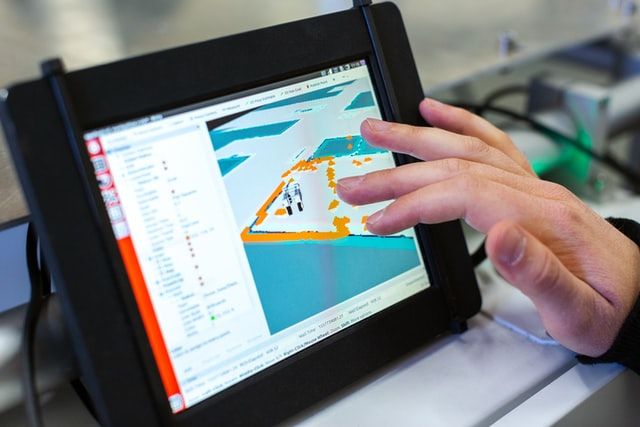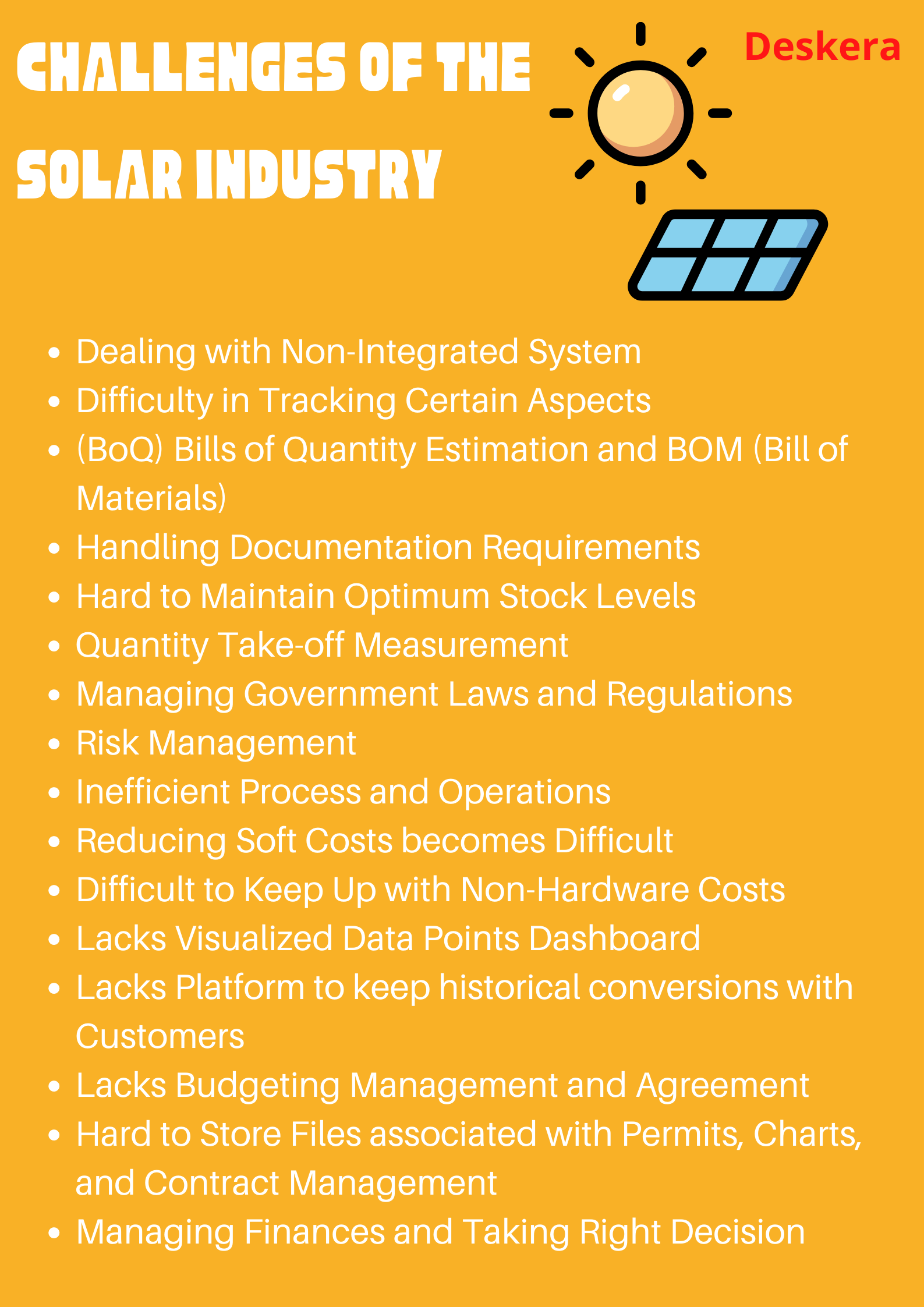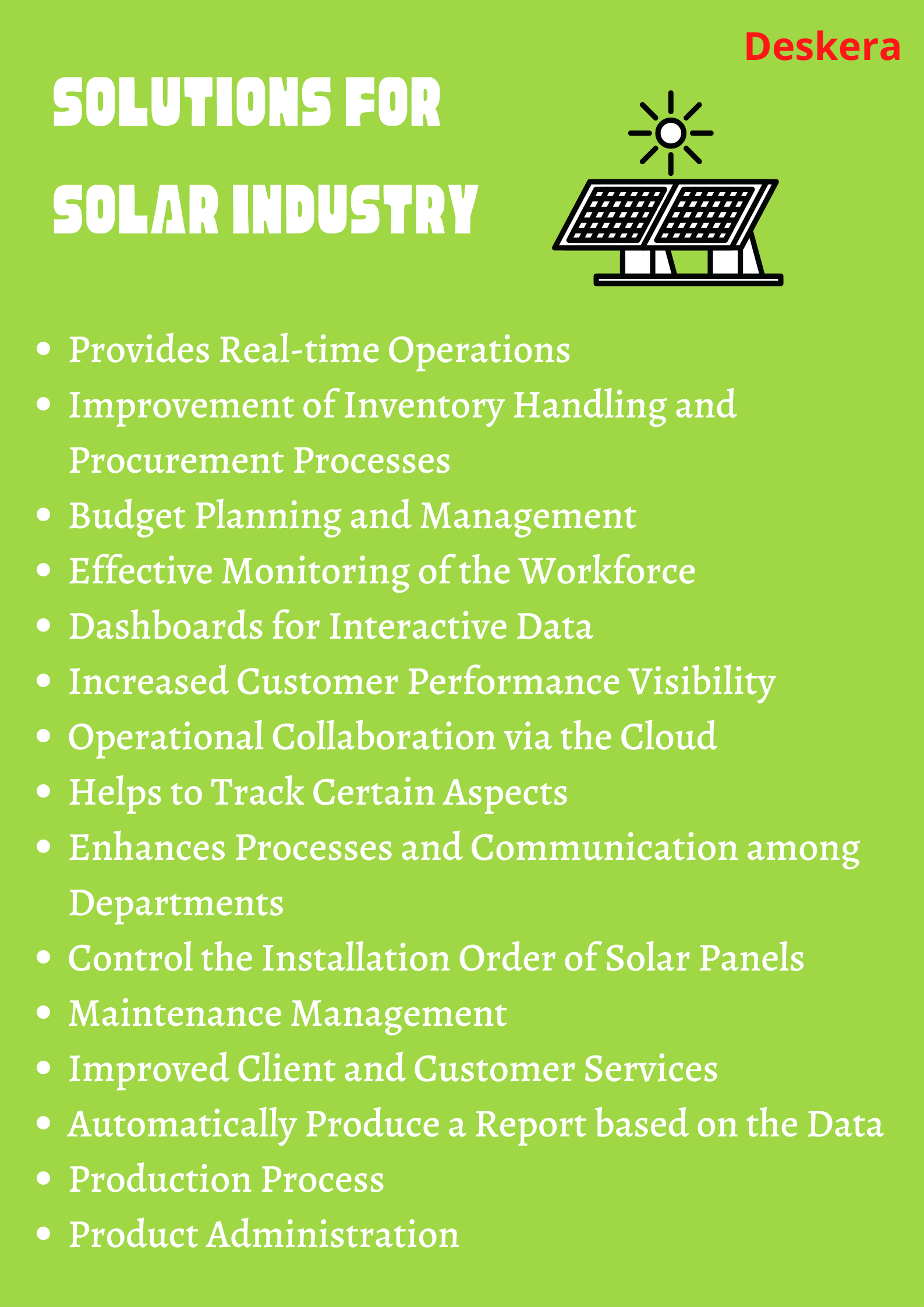By 2023, there will be an increase in solar capacity of more than 1 terawatt. About one-third of the entire energy used in the US would be supplied by that.
In addition, the total amount of solar energy connected to the electric grid has multiplied more than twenty-fold since 2008. Millions of Americans have adopted clean technology to power their lives, which is why this is the case.
The rise of the solar industry to one of the most promising commercial areas has made the world more competitive. The industry's primary areas of focus include solar panel manufacturing, setup, power management, and other tasks.
ERP is the tool that solar enterprises may use to build and scale their profitability while streamlining these key areas. The majority of the organizations absolutely require an ERP system to stay on track. It helps to connect all the systems and workflow into a unified single system.
In today’s guide, we’ll learn thoroughly about Enterprise Resource Planning (ERP) for solar industries, and will below-mentioned topics. Let’s take a look before we start:
Understanding ERP for Solar Industry
Why does your Business Need ERP for Solar Industry?
What are the Solutions for Solar Industry?
How does Deskera Help with an ERP for Solar Power Industry?
Let’s Dive in!
Understanding ERP
Enterprise resource planning (ERP) is a process used by businesses to organize and control the essential elements of their processes and operations.
Numerous ERP technology software programs are crucial to businesses since they assist in the implementation of resource planning by combining all business operations into a single system.

A software system for enterprise resource planning (ERP) can also incorporate inventory buying, planning, sales, marketing, finance, and other functions.
In simple words, an enterprise resource planning system works as a unified data set solution that tie together the entire workflow across the entire organization.
Understanding ERP for Solar Industry
Solar ERP software is enterprise resource planning software that has been specially adapted to the requirements of the solar industry.
Developers, commercial and utility-scale installers, and residential rooftop installers can all utilize solar ERP software that is adapted to their requirements.
ERP for the solar industry was developed specifically for companies that install solar panels. It can help with everything that includes project management, billing, sales, estimating, monitoring, invoicing, compliance management, reporting, portfolio administration, contract management, warranty management, event management, work order management, financial reports, and some level of analytics and forecasting.
ERP for Solar Industry can boost business productivity while also saving you both money and time.
Why does your Business Need ERP for Solar Industry?
Many solar installers still run their businesses using a combination of different technological systems, incompatible entry-level software, and specialized programs, even as they grow to meet the expanding demand for solar installations.
If all the systems are not fully integrated, procurement, installation, sales, accounting, invoicing and inventory data will have to be managed in different silos, making the task of reconciling information tedious and time consuming. These are hours that ought to be spent to grow the business.
Furthermore, processes can easily degenerate into a patchwork of old worksheets that are used to manually transfer data between unrelated programs.
Undoubtedly, this isolated strategy is time-consuming and ineffective in the collaborative today's world. Partners from within and outside the company want the same technology platforms, including cloud-based solar ERP software.
To help you with such obstacles, ERP can guarantee that you will find the ideal answer to all of your business-related difficulties.
ERP software offers all the features required to run a business. It can be divided into a number of discrete modules or functionally significant sections, providing the organizational framework required for departments to effectively collaborate and share resources.
It includes business operations, managing finances, coordinating the staff, and creating business plans, which can oversee numerous facets of the business sector.
Remember that every year, more money is being invested in the solar business. Among the many competitors in the market, a wise investor seeks out a great support system for managing the firm.
Therefore, ERP would be a smart option to adequately manage the complete solar manufacturing process.
What are the Challenges of the Solar Industry?
Following we have discussed some common challenges faced by the solar power industry without ERP. Let’s learn:

Dealing with Non-Integrated System
Functionality for team communication and customer relationship management, inventory management, and project management are not connected.
Difficulty in Tracking Certain Aspects
It is difficult to track various aspects when it comes to solar power industry. It further leads to delays and disruptions in the workflow process.
For example, tracking maintenance service, field service, GPS tracking of field installation employees, purchase order tracking, scheduling, work-order processing, tracking solar panel gears prices, tracking of current inventory, sales, suppliers, and other business operations, procurement (safety stock), variation order, and more.
(BoQ) Bills of Quantity Estimation and BOM (Bill of Materials)
Bills of quantities (BoQ), a systematic approach employed in the solar or construction industry, have as their main objectives the documentation of work items for tendering purposes and the creation of a fair agreement among the parties concerned for contracting purposes.
On the other hand, a list of the materials needed to construct a product is called a bill of materials (BoM). The manufacturer's part number (MPN) and the required quantity for each component are provided in the BOM.
The project planners and contractors understand the inventory requirements for a project. While BOM refers to the list of inventory, which includes parts, components, raw materials, etc.
Project developers require specific quotations for project provides information on what is required to complete the project. Both of these improve planning while lowering the likelihood of mistakes and inventory shortages later on, which could cause project delays.
Without ERP, it is quite difficult to handle BoQ and BOM.
Handling Documentation Requirements
Different solar lenders have different documentation requirements. And, it becomes challenging to handle and maintain all the documentation requirements, files, and subsidy.
Hard to Maintain Optimum Stock Levels
It became challenging and hard to keep ideal stock levels despite frequent price changes while completing projects and meeting deadlines.
Quantity Take-off Measurement
Quantity take-offs (QTO) are exact assessments of the amount of materials and labour needed to complete a construction project. They are produced by an estimator during the pre-construction phase.
To keep up with right assessments, ERP is needed for this approach as it helps to keep the project is separated into more manageable, smaller chunks that are also easier to measure and estimate.
Managing Government Laws and Regulations
Any renewable power industry, including solar power industry requires to mandate government laws and regulations. Furthermore, it is challenging for industries to keep up with all documents, files, and so on because of extensive and manual system.
Risk Management
The most important risk factors associated with the installation of solar projects are technical risk, political risk, financial risk, and environmental risk.
Inefficient Process and Operations
Inefficient solar installation process and operational tasks that could hamper the efficient solar industry workflow.
Reducing Soft Costs becomes Difficult
It becomes difficult without ERP in reducing soft costs (expenses solar companies pay to grow sales volume, compensate suppliers, train workers, and cover their bottom lines)
Difficult to Keep Up with Non-Hardware Costs
Non-hardware costs of switching to solar ERP include licensing, acquiring financing, and installing solar panels.
Lacks Visualized Data Points Dashboard
Without ERP dashboard, it becomes quite challenging to maintain everything in order such as accurate real-time data, installation process, and so on.
Lacks Platform to keep historical conversions with Customers
Enterprises lacks platform for historical conversations with customers, their purchases, signatures on agreements, and so on.
Lacks Budgeting Management and Agreement
Managing ongoing costs in budgeting, as well as managing agreements becomes hard without any ERP software.
Hard to Store Files associated with permits, Charts, and Contract Management
Solar businesses must try to manage several architectural tools, CAD drawings, and other data. They need a place to store these files, link them to certain activities, and then access them as needed.
These processes take a lot of time, require a lot of work, and are prone to mistakes. Because their systems are not integrated, solar businesses cannot readily transfer diagrams, permits, contracts, and other documentation from one solution to another.
Managing Finances and Taking Right Decision
Inaccurate and no up-to-date information on the budget constraints model. If it becomes challenging to manage finances and budgets in large enterprises, then it may critically affect in taking the right decisions on certain levels.
What are the Solutions for Solar Industry?
In recent years, the solar energy industry has grown tremendously. This is due, at least in part, to technological advancements that have lowered the price and improved the efficiency of solar energy.
However, you will also find a number of technological and practical issues that the solar energy business must address. And, ERP software could help to tackle such issues.
Following we have discussed solutions offered by ERP for Solar Industry that also support business growth.
Let’s learn;

Provides Real-time Operations
The ability for businesses to acquire precise, real-time data about their multiple operations is one of the major advantages of employing solar energy ERP software.
For instance, the Solar Industry could obtain real-time report on the electricity generated by industry-controlled power plants using the ERP tool. The examination of the power generation trend for different locations and the growth of technology would both benefit from the data on power generation.
Moreover, the software support can help in gathering accurate statistics on energy production and consumption and can help in monitoring the activities of all sectors.
Since many teams in the solar sector, including the sales team and the technical team, are constantly on the go, real-time access is necessary for effective functioning.
Additionally, ERP software can aid solar energy companies in better financial management. They have access to the most latest information regarding financing, sales, suppliers, stock, and other corporate operations.
They can keep track of everything, allowing them to utilize this information to increase team productivity and help them make more sensible business decisions.
Furthermore, it is easy to manage the daily report production on the efficacy of the marketing wing, daily expenses, and selling operations.
Improvement of Inventory Handling and Procurement Processes
Another benefit is that ERP software may automate business processes like procurement. This further suggests that ERP systems enable organizations to process orders more swiftly and simply.
Organizations may manage their inventories more efficiently with the use of ERP software. They can decide what products to stock and how much inventory to keep on hand by having access to real-time data.
ERP can expedite order processing by more accurately cataloguing and arranging inventory items. This tool can be used to decrease stock-outs, estimate demand, and lessen the risk of overstocking in order to manage inventory more effectively.
Budget Planning and Management
Effective planning and budgeting are crucial for a business to prosper. The budget can be successfully prepared by using data reported from the previous year.
By using statistical information from earlier years or months, businesses can make more informed budget decisions.
Additionally, this is done so that businesses may create budget plans with intelligence and have access to reliable, up-to-date information about their financial situation. Both of these tasks are possible with ERP software.
Moreover, it will help in forecasting consumer spending patterns and market trends. It will aid in the planning of the product's manufacturing, the allocation for R&D, infrastructure development, and human resource management can be quickly determined using Enterprise Resource Planning (ERP) software. ERP software can also assist organizations in monitoring their spending trends and identifying areas for cost-cutting.
By analyzing this data to ascertain how much customers typically spend in particular categories, businesses can make plans for future expenditures. Businesses can use this information to stay within their budgetary restrictions, which is crucial for achieving success in any sector of the economy.
Effective Monitoring of the Workforce
The efficiency of a company's operations is determined by how well its employees are utilized. Using an ERP platform, all workforce operations are monitored and recorded.
Furthermore, it is possible to effectively manage staff work schedules and compute work hours with the aid of a customized ERP solution.
Using the best energy management software, tasks like managing staff leave, coordinating the insurance system, and other duties are systematized.
Dashboards for Interactive Data
Solar software enables businesses to obtain accurate, real-time data on a variety of their operations. This data can be presented as a dynamic dashboard rather than a static report.
It further assists owners of solar installation businesses in making better business decisions regarding sales, purchasing, financial management, production, and installation.
By having easy access to these exhibited data aspects, businesses can feel more certain that the information they rely on is accurate and current.
Increased Customer Performance Visibility
You may use customer data from the CRM to learn more about your customer base, identify your most valuable clients, and learn which customers might need more attention. These extra tools can also be used to deal with problems before they turn into major problems.
Operational Collaboration via the Cloud
Everyone in your company can have access to features even when they are not in the office with the help of ERP software.
From any location with an internet connection, employees may examine current financial and inventory information.
Because the solution is cloud-based ERP, it may be utilized on any platform, including Apple's iPhone, Windows, Android, and Samsung Galaxy handsets.
Documents from various departments will be automatically recorded by the cloud-based system. Additionally, it will support the industry's management of solar power plant operations.
With cloud support, model plants and the plants that the solar company runs for its clients may be handled with ease. Additionally, it guarantees efficient departmental operations.
Also, ERP helps to obtain e-mail, SMS notifications, job assignments, and more.
Helps to Track Certain Aspects
ERP also helps to track field service, maintenance schedule of solar panels, alerts for day-to-day activities, GPS tracking of time in & time out of workforce staff, tracking expenses project-wise, attendance, historical conversations with customers, e-signatures with customers, leaves, claims, contracting purposes, and more.
Enhances Processes and Communication among Departments
Employees can easily maintain the communication between different departments such as HR, finance, production, accounts, IT, and more. Enterprise Resource planning further helps them to share instant data transfer among entire enterprise departments.
Moreover, ERP assists to generate faster invoices, payroll process. Ultimately, the effectiveness of the solar sector is improved with the help of ERP software.
Control the Installation Order of Solar Panels
If you don't have a dependable ERP to keep things organized, managing orders might be challenging. Order organization, management, and documentation options are included in the top energy management software.
Each order, including production orders, purchase orders, and sales orders, may be managed with a single click. The manufacturing schedule may also be determined by the order.
Maintenance Management
Do you struggle to remember to maintain and service other pieces of equipment, such as solar panels? In order to ease your troubles, we provide you the best ERP solution. Customers may immediately report issues because of ERP.
Moreover, the company will list and organize the service requests using the software solution. The business will benefit and tasks will be completed quickly if service requests are distributed among several service teams.
Improved Client and Customer Services
Solar installers' ERP software can help companies streamline their sales operations, which enhances their client and customer service.
You can easily obtain visibility into previous customer contacts and transactions because your team uses a single system, and you can use this information to guarantee the best possible customer experience.
Using an ERP will allow your team to centralize customer interactions and ensure that any issues are resolved as quickly as possible from a support standpoint.
Automatically Produce a Report based on the Data
The administration of data and effective use of such data for analytical purposes is the key component of the ERP system. Determining actual expenditures and revenue is made easier by the facility for data management and report generation.
Furthermore, it might also assist you in ensuring business transparency. A cloud-based Solar Industry ERP makes it simple to collect and document data from many sub-centers.
A useful study for the investor would be the patterns of revenue generation at various units. Finding the firm's highs, lows, and vulnerabilities is also made simple with the use of the ERP.
Production Process
The production process is determined by consumer demand for the product. Profits can be guaranteed if production is planned in accordance with consumer and market demand. The investor can better receive input from merchants and direct customers by implementing an ERP system.
Product Administration
If you rely on the assistance of ERP consultants, packing and shipping of solar items can be accomplished without difficulty. You can use it to provide domestic and business consumers with an efficient system for packaging, shipping, and receiving equipment.
How does Deskera Help with an ERP for Solar Power Industry?
The Deskera ERP software system allows enterprises to generate faster invoices, payroll system. Deskera People can help you with your new small business venture remarkably well. It allows you to conveniently manage leave, attendance, payroll, and other expenses. Generating pay slips for your employees is now easy as the platform also digitizes and automates HR processes.
Moreover, features like a flexible payment schedule, custom payroll components, detailed reports, customizable pay slips, scanning, uploading expenses, and creating new leave types make your work simple and effective.

Final Takeaways
We've arrived at the last section of this guide. Let's have a look at some of the most important points to remember:
- Enterprise resource planning (ERP) is a process used by businesses to organise and control the essential elements of their processes and operations.
- A software system for enterprise resource planning (ERP) can also incorporate inventory buying, planning, sales, marketing, finance, and other functions.
- Solar ERP software is enterprise resource planning software that has been specially adapted to the requirements of the solar industry.
- Bills of quantities (BoQ), a systematic approach employed in the solar or construction industry, have as their main objectives the documentation of work items for tendering purposes and the creation of a fair agreement among the parties concerned for contracting purposes.
- A list of the materials needed to construct a product is called a bill of materials (BoM). The manufacturer's part number (MPN) and the required quantity for each component are provided in the BOM.
- ERP software offers all the features required to run a business. It can be divided into a number of discrete modules or functionally significant sections, providing the organizational framework required for departments to effectively collaborate and share resources.
- Quantity take-offs (QTO) are exact assessments of the amount of materials and labour needed to complete a construction project. They are produced by an estimator during the pre-construction phase.
- The ability for businesses to acquire precise, real-time data about their multiple operations is one of the major advantages of employing solar energy ERP software.
- Organizations may manage their inventories more efficiently with the use of ERP software. They can decide what products to stock and how much inventory to keep on hand by having access to real-time data.
- Effective planning and budgeting are crucial for a business to prosper. The budget can be successfully prepared by using data reported from the previous year.
- By using statistical information from earlier years or months, businesses can make more informed budget decisions.
- The efficiency of a company's operations is determined by how well its employees are utilized. Using an ERP platform, all workforce operations are monitored and recorded.
- You may use customer data from the CRM to learn more about your customer base, identify your most valuable clients, and learn which customers might need more attention.
- Everyone in your company can have access to features even when they are not in the office with the help of ERP software.
- From any location with an internet connection, employees may examine current financial and inventory information.
- With cloud support, model plants and the plants that the solar company runs for its clients may be handled with ease. Additionally, it guarantees efficient departmental operations. Also, ERP helps to obtain e-mail, SMS notifications, job assignments, and more.
- ERP also helps to track field service, maintenance schedule of solar panels, alerts for day-to-day activities, GPS tracking of time in & time out of workforce staff, tracking expenses project-wise, attendance, historical conversations with customers, e-signatures with customers, leaves, claims, contracting purposes, and more.
- From any location with an internet connection, employees may examine current financial and inventory information. Because the solution is cloud-based, it may be utilized on any platform, including Apple's iPhone, Windows, Android, and Samsung Galaxy handsets.
- ERP assists to generate faster invoices, payroll process. Ultimately, the effectiveness of the solar sector is improved with the help of ERP software.
- Solar installers' ERP software can help companies streamline their sales operations, which enhances their client and customer service.
- A cloud-based Solar Industry ERP makes it simple to collect and document data from many sub-centers.
- A useful study for the investor would be the patterns of revenue generation at various units. Finding the firm's highs, lows, and vulnerabilities is also made simple with the use of the ERP.
- Profits can be guaranteed if production is planned in accordance with consumer and market demand. The investor can better receive input from merchants and direct customers by implementing an ERP system.
- You can use ERP to provide domestic and business consumers with an efficient system for packaging, shipping, and receiving equipment.
Related Articles















